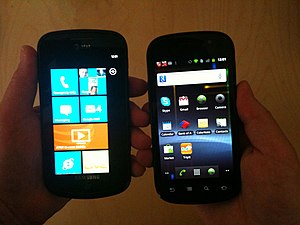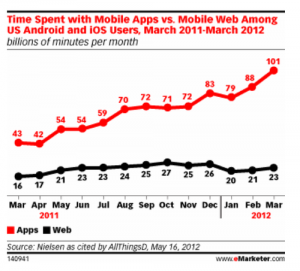The numbers show marketers are rushing into mobile. The numbers also indicate they are leaping before they look. So, if you want to know what’s better for your business: Mobile App or Mobile Website? Forget the tactics, buzzwords and lingo; focus on the needs of your business.
- 96% of marketers currently use or are planning to incorporate mobile marketing into their marketing mix (Source: ANA (Association National Advertisers))
- 85% report an intent to raise their mobile budgets in the near future (ANA)
- 84% use mobile websites; 78% mobile search; 76% mobile apps and 75% mobile display ads (ANA)
- 59% of mobile websites are launched without testing or optimization (Source: Marketing Sherpa)
- Only 16% of marketers have a mobile strategy (Source: CMO Council)
- Only 14% are satisfied with the way their brands are accessing and leveraging mobile (CMO Council)
What’s better for your business? Mobile App or Mobile Website? Here are 14 business decision makers.

MOBILE WEBSITES
- REACH PEOPLE FROM SEARCH: If you want your business to be found through a mobile search query, a mobile website is the way to go. Google has seen 400% increase in the number of mobile searches within a year (Source: Icebreaker Consulting). For Apps, you’re found on the Android or Apple App Stores, not mobile search
- BENEFIT FROM LOCAL SEARCH: While we’re on the subject of search, if your business has a local client base, local searches on mobile device is fast outpacing desktop. Of the estimated 30 billion annual mobile searches, about 12 billion are local searches. Local mobile searches (85.9 billion) are projected to exceed desktop searches (84 billion) for the fist time in 2015 (Source: Search Engine Land).
- SIMPLE CROSS PLATFORM SCALABILTY: Mobile websites work across all platforms, while apps are device-specific (i.e. iPhone, Android), requiring a business to develop an app for each platform. Mobile websites are generally easier to manage from a development standpoint.
- LOW DEVELOPMENT COST: Since a mobile website is essentially a different front end for a website, the development is generally less involved than an App.
- LESS RED TAPE: For an app, you need to request permission and go through an approval process with Google and Apple. The approval process with Apple can take up to a month. For a mobile website, there is no approval process.
- NO DOWNLOADING REQUIRED: Mobile website don’t have to be downloaded to use. On the internet, every extra step is a reason why a customer drop offs.
- ANALYTICS FRIENDLY: Tracking clicks and behavior is as simple (and insightful) on a mobile site as it is on an old-fashioned webpage. Almost a third of website traffic now comes from mobile devices, +73% from a year ago, according to the Walker Sands Quarterly Mobile Traffic Report.
- MOBILE SITE VS. RESPONSIVE DESIGN: Responsive Web Design (RWD) as it is commonly referred to, implies the formatting of Website design in a way that it most optimal for viewing and navigation across a wide range of devices, including traditional PCs, smartphones and tablet devices. While it is more expensive due to development time, Google thinks this is the better solution for avoiding any complicated redirects and simplifying the sharing of web addresses.
MOBILE APPS
- BETTER USER EXPERIENCE: Written in “native code,” the technical language of a particular platform; such as the Rim Blackberry OS, iPhone OS, Windows Mobile, Android, or MeeGo, the use of native code allows the app to run with high performance, quality and speed.
- FASTER, MORE INTERACTIVE: Site loading speed counts, especially on mobile. And loading speed for apps is almost 2x as fast as mobile websites. Plus, apps supports action-packed 3D games and resource-hungry applications that rely heavily on touch.
- GREATER INVOLVEMENT: A primary advantage of mobile apps is people spend more time on them, almost +4X more time and growing. However, 1 in 4 people who download an app never use them again.

- OFFLINE AS WELL AS ONLINE ACCESS: If your business has customers who may not always have access to the internet, an app is the solution. Let’s farmer needs to access crop data from a remote field? Done. Or, if you’re in real estate, and your client wants to house hunt during his/her morning subway commute? It’s no problem with an app.
- DEVICE INTEGRATION: Apps can integrate a camera and geo-location service for a fuller experience for both the user. If your business is built around a customer log-in, apps take the experience to a more more personalized place than a mobile website.
- LOYALTY AND RETENTION: Just as search is a major advantage for mobile websites,a better user experience that secures greater retention and loyalty is a major reason and advantage to consider a mobile app.
Of course, there is no reason why a business can’t have both. And many do.
But, as you think about what’s right for you, let your business strategy be your guide before the tactics and buzzword. You’ll be way away of your competition.
Mobile Apps vs. Mobile Websites is a topic that Mike Moran and I teach in on Online Course at UCI Irvine on Website Optimization. Anyone can take this course from any location.
Did this help decide whether a Mobile Website or Mobile App is right for your business? Did it help you think about your strategy for mobile?




